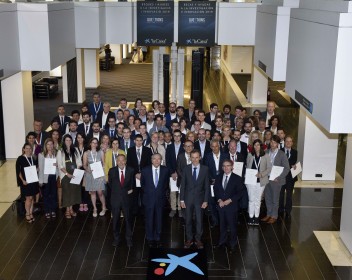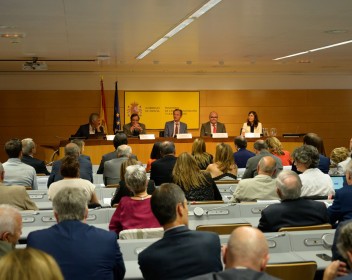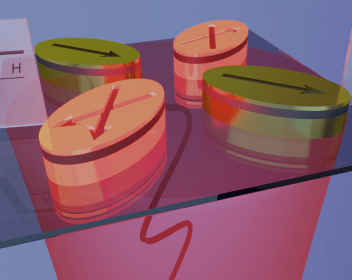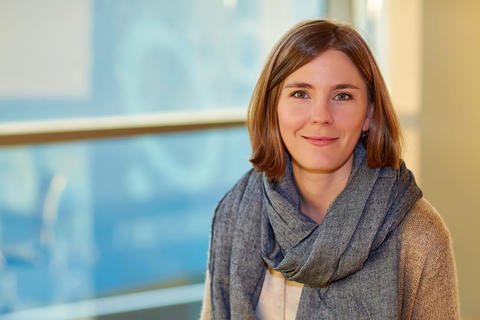Noticias
Are new materials set to generate new technologies?
The researcher Marco Gobbi has been awarded one of the 33 “la Caixa” Junior Leader post-doctoral grants and will be joining nanoGUNE on 30 September.
SOMMa research institutions highlight the impact of the Severo Ochoa-Maria de Maeztu programme for Spanish Autonomous Communities
Recently took place a meeting between the Ministry of Science, Innovation and Universities, the Severo Ochoa and Maria de Maeztu centres and units of excellence and high-officials and counselors of 15 autonomous communities. The programme of excellence “Severo Ochoa - Maria de Maeztu” identifies and promotes the excellence in scientific research. Its objective is to give recognition to the research institutions at the forefront of their fields, and to boost their impact, international scientific leadership and competitivity.
Artificial atomic scale materials: discovering how electrons fatten!
A single and isolated electron has a clear electrical charge, magnetic moment and mass, and its free movement can be precisely predicted. Spanish scientists fabricated a nanoscale artificial material manipulating atoms one after the other and discovered that electros around are very heavier. Heavy electrons are promising particles which endow of new functionalities to novel materials. This study is the result of an international collaboration leaded by the Instituto de Nanociencia de Aragón and the Instituto de Ciencia de Materiales de Aragón (ICMA), in which scientists at CIC nanoGUNE participated, together with members of the Centro de Física de Materiales (CFM) in San Sebastian, and the Charles University and Czech Academy of Sciences, in the Check Republic.
nanoGUNE services and technologies showcase at BEC Bilbao
A great opportunity for your company to get technical advice to improve your products and processes. From 4 to 6 June, nanoGUNE's specialists will be at the International Fair of Processes and Equipment for Advanced Fabrication in BEC Bilbao.
Fast and selective optical heating for functional nanomagnetic metamaterials
In a recent article published in Nanoscale, researchers from the Nanomagnetism group at nanoGUNE demonstrate the use of hybrid magnetic-plasmonic elements to facilitate contactless and selective temperature control in magnetic functional metamaterials. Compared to so-far used global heating schemes, which are slow and energy-costly, light-controlled heating, using optical degrees of freedom such as light wavelength, polarisation, and power, allows to implement local, efficient, and fast heating schemes for the use in nanomagnetic computation or to quantify collective emergent phenomena in artificial spin systems.
CIC nanoGUNE joins the Packaging Cluster
As CIC nanoGUNE becomes involved in social awareness about finding alternatives to plastic, it has internally committed itself towards a technology that could offer fully biodegradable packaging. One strategic step in this direction is nanoGUNE’s recent membership of the Packaging Cluster.
The first loudspeaker with graphene-based technology is already on the market
Researchers in the Nanobiomechanics group at CIC nanoGUNE and engineers at SEAS Fabrikker, leader in the premium-range audio loudspeaker sector, have conducted joint research in which they have succeeded in improving the loudspeaker cones, thanks to graphene. These premium-range loudspeakers with graphene-based technology resulting from this collaboration have recently been launched onto the market by the Norwegian company.
nanoGUNE joins the Basque Health Cluster
nanoGUNE is proud to be part of one of the region’s most important and active clusters: the Basque Health Cluster.
International Day of Women and Girls in Science brought to Donostia-San Sebastian by four research centres
The research centres Donostia International Physics Center (DIPC), the Centre for Materials Physics (CFM CSIC-UPV/EHU), CIC nanoGUNE and CIC biomaGUNE have joined forces to present a joint programme to mark International Day of Women and Girls in Science, being held worldwide on Monday, 11 February. In Donostia-San Sebastian the programme will go on until Friday 15 February with public talks, workshops, visits and seminars in which 50 volunteers from the organising research centres will be participating. The aim of the initiative is to transmit a clear message: Science is girls’ stuff.
CIC nanoGUNE: a decade of science, collaboration, training and transfer
Nanoscience and nanotechnology are already and are set to become the great architects of true transformations. The production of graphene, for example, which everyone regards as a material of the future owing to the numerous properties it is capable of bringing together, would have been impossible without the advances in nanotechnology and without the knowledge generated by research teams such as that of nanoGUNE. Research into nanoscience and nanotechnology calls for highly sophisticated architectural and engineering conditions that make it possible to tackle experiments that would be impossible at an ordinary facility. NanoGUNE built a state-of-the-art infrastructure for this purpose ten years ago.
Agenda
| Mon | Tue | Wed | Thu | Fri | Sat | Sun |
|---|---|---|---|---|---|---|
|
1
|
2
|
3
|
4
|
5
|
6
|
7
|
|
|
|
|
|
|
|
|
|
9
|
10
|
11
|
12
|
13
|
14
|
|
|
|
|
|
|
|
|
|
|
15
|
16
|
17
|
18
|
19
|
20
|
21
|
|
|
|
|
|
|
|
|
|
22
|
23
|
24
|
25
|
26
|
27
|
28
|
|
|
|
|
|
|
|
|
|
1
|
2
|
3
|
4
|
5
|
||
|
|
|
|
|
|
Events
- 28/07/2024 to 01/08/2024
International Conference on Optical MEMS and Nanophotonics - OMN 2024
nanoVISUALS
Find events' photos, experimental images, videos, audios, and nanoGUNE's corporate images.




